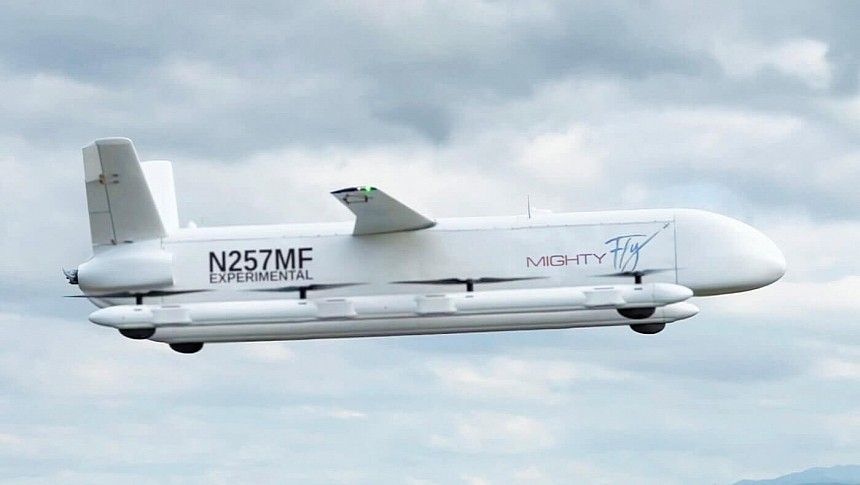MF100 is the bland, formal name of a very exciting flying machine. The third-generation cargo aircraft developed by MightyFly has the potential to transform same-day deliveries radically with autonomous, hybrid eVTOL (electric vertical takeoff and landing) capabilities. An SBIR Phase II contract awarded by the US Air Force confirms the MF100's game-changing potential.
There's no doubt that autonomous capabilities and green propulsion are the future of air transportation, including cargo deliveries, and AFWERX is betting on these solutions for tomorrow's logistics. AFWERX is the innovation arm of the Department of the Air Force (DAF), supported by AFRL (the Air Force Research Laboratory).
For the past years, it has powered numerous innovations that have the potential to transform air transport in many ways. The SBIR (Small Business Innovation Research) program is part of AFWERX's AFVentures division.
The San Francisco-based MightyFly was one of the companies that were recently selected for an SBIR Phase II contract. It plans to use the $1.25 million specifically for advancing its ALMS technology. This autonomous load mastering system is what makes the MF100 aircraft stand out among similar cargo options.
Through the ALMS, cargo is loaded and unloaded with minimal human supervision. This transforms what is typically a labor-intensive operation into a seamless, fast, and virtually error-free process. As a result, the aircraft can conduct same-day and expedited delivery systems more efficiently.
To this innovative cargo technology, MightyFly has added a hybrid-propulsion system that enables the MF100 to recharge its batteries during flight. Thanks to this, it can complete multiple deliveries on a single-flight route. Plus, hybrid propulsion comes with the added benefits of fewer emissions and lowered operational costs.
The combination of hybrid-electric propulsion and the ALMS autonomous system could be the winning formula for transforming cargo deliveries across a wide range of applications. This VTOL aircraft could provide efficient, low-cost service not just for standard logistics but also for defense logistics, humanitarian and disaster relief operations, medical care, and the automotive industry (it could be quickly dispatched for fixing vehicles and other equipment).
The MF100 is officially a short-haul, medium-load autonomous cargo drone that can carry up to 500 lbs (227 kg) over 600 miles (966 km), reaching a maximum speed of 150 mph (241 kph).
The San Francisco company is on track to bringing its third-generation heavy-duty drone to the market. Following this recent financial boost from AFWERX, it intends to have the MF100 aircraft manufactured by the end of this year.
Next year, the MF100 is set to make its public debut. It will conduct flight demonstrations for actual deliveries of up to 100 lbs of payload in Michigan. It will be the third-generation aircraft's first 100-pound delivery over a long-distance route. Additional proof of concept (POC) programs are set to be carried out throughout 2024, all the way to 2025.
For the past years, it has powered numerous innovations that have the potential to transform air transport in many ways. The SBIR (Small Business Innovation Research) program is part of AFWERX's AFVentures division.
The San Francisco-based MightyFly was one of the companies that were recently selected for an SBIR Phase II contract. It plans to use the $1.25 million specifically for advancing its ALMS technology. This autonomous load mastering system is what makes the MF100 aircraft stand out among similar cargo options.
Through the ALMS, cargo is loaded and unloaded with minimal human supervision. This transforms what is typically a labor-intensive operation into a seamless, fast, and virtually error-free process. As a result, the aircraft can conduct same-day and expedited delivery systems more efficiently.
To this innovative cargo technology, MightyFly has added a hybrid-propulsion system that enables the MF100 to recharge its batteries during flight. Thanks to this, it can complete multiple deliveries on a single-flight route. Plus, hybrid propulsion comes with the added benefits of fewer emissions and lowered operational costs.
The combination of hybrid-electric propulsion and the ALMS autonomous system could be the winning formula for transforming cargo deliveries across a wide range of applications. This VTOL aircraft could provide efficient, low-cost service not just for standard logistics but also for defense logistics, humanitarian and disaster relief operations, medical care, and the automotive industry (it could be quickly dispatched for fixing vehicles and other equipment).
The MF100 is officially a short-haul, medium-load autonomous cargo drone that can carry up to 500 lbs (227 kg) over 600 miles (966 km), reaching a maximum speed of 150 mph (241 kph).
The San Francisco company is on track to bringing its third-generation heavy-duty drone to the market. Following this recent financial boost from AFWERX, it intends to have the MF100 aircraft manufactured by the end of this year.
Next year, the MF100 is set to make its public debut. It will conduct flight demonstrations for actual deliveries of up to 100 lbs of payload in Michigan. It will be the third-generation aircraft's first 100-pound delivery over a long-distance route. Additional proof of concept (POC) programs are set to be carried out throughout 2024, all the way to 2025.








